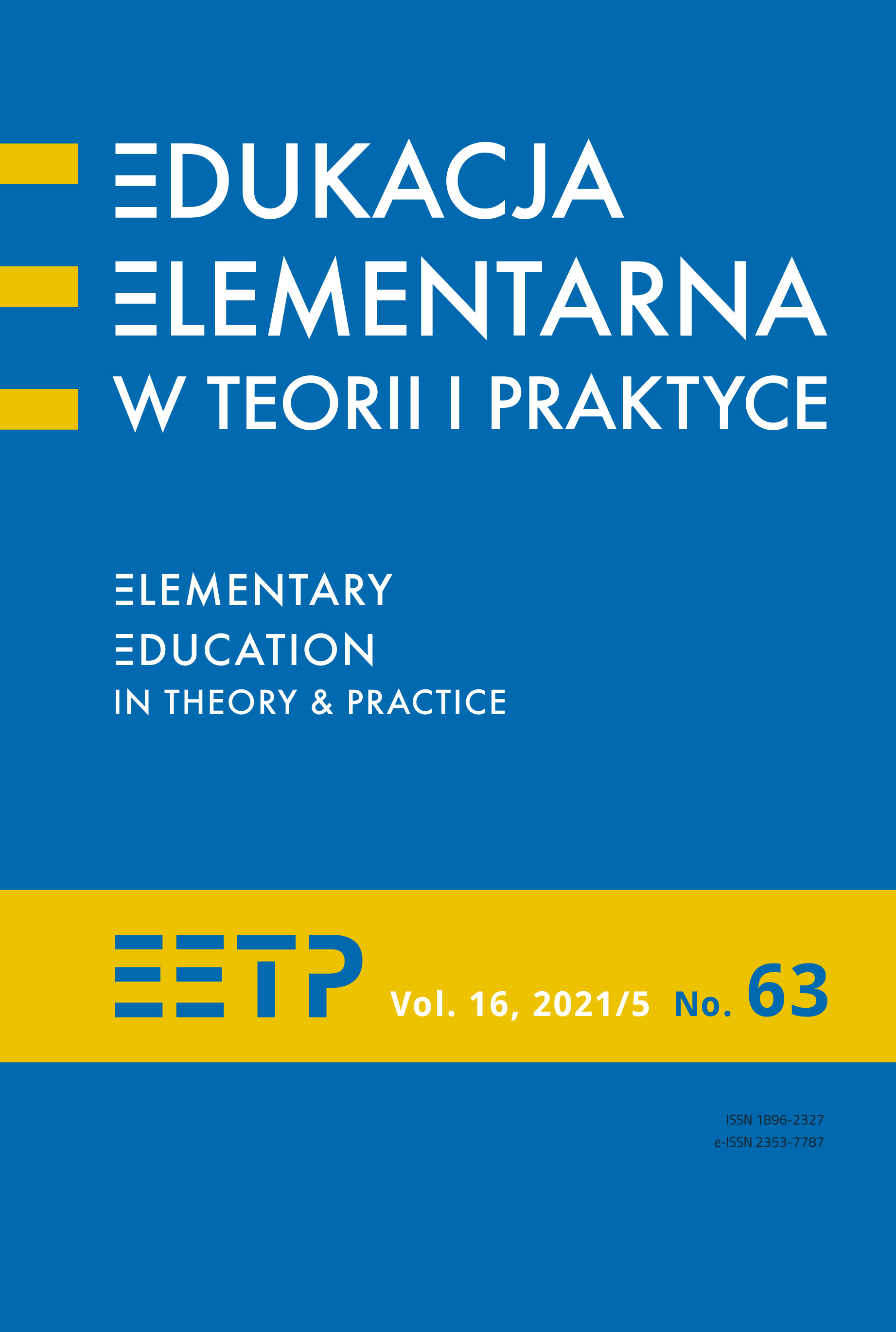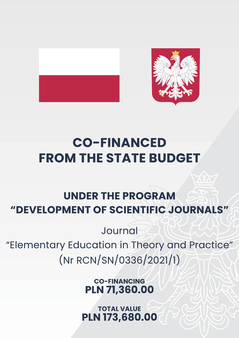Kitchen as STEM Laboratory in a Preschool - from Experiment to the Learning Pathway
Abstract
The article has been written within the Erasmus+ project entitled “Kitchen Lab 4 Kids”. The aim of this presentation is to present STEM skills and their connections with scientific thinking. STEM skills are described as interdisciplinary meta-competences underlying the life-long learning process, employed in the process of solving meaningful, interdisciplinary problems, but not belonging to any particular scientific discipline. They are often referred to as 21st -century skills necessary for the functioning and development in modern, unpredictable and rapidly changing societies. This paper argues that the development of such skills is deeply rooted in early childhood and should be supported in a preschool environment with the use of tools and means available in every preschool kitchen. Typical “kitchen” skills, used while cooking and food processing, are scientific by nature because they are based on understanding chemical and physical processes / concepts, e. g. weighing ingredients, understanding the proportions of the ingredients, observing the state of matter transformations (from solid to liquid and vice versa), coloring food with natural pigments, using fermentation to bake bread, etc. Comprehending these and similar processes can support the development of scientific thinking in early childhood.
References
Brenneman, K. (2011). Assessment for preschool science learning and learning environments. „Early Childhood Research & Practice”, 13(1). Retrieved from
https://ecrp.illinois.edu/v13n1/brenneman.html Accessed 15,05.2021.
Brenneman K., Lange A., Nayfeld I. (2019). Integrating STEM into Preschool Education; Designing a Professional Development Model in Diverse Setting, „Early Childhood Education Journal” 57, 15-28, DOI: 10.1007/s10643-018-0912-z
Bruner J.S. (2006), Kultura edukacji, Warszawa: PWN
Brzezińska A.I., Matejczuk J., Nowotnik A. (2012). Wspomaganie rozwoju dzieci w wieku od 5 do 7 lat a ich gotowość do radzenia sobie z wyzwaniami szkoły, „Edukacja” 1 (117), 7-22.
Clement, John (2000). "Model based learning as a key research area for science education". International Journal of Science Education. 22 (9): 1041–1053. doi:10.1080/095006900416901. S2CID 145367158.
Clements D.H., Sarama J. (2016), Math, Science, and Technology the Early Grades, „Future of Children” Vol. 26, No 2, p. 75-94, <https://files.eric.ed.gov/fulltext/EJ1118544.pdf>, (dostęp dnia 10.11.2019).
Dilek H., Tasdemir A, Konca A.S., Baltic S. (2020), Preschool Children’s Science Motivation and Process Skills during Inquiry-Based STEM Activities, „Journal of Education in Science, Environment and Health” vol 6(2), DOI: 10.21891/jeseh.673901
Gruszczyk-Kolczyńska E., Zielińska E. (1997).Dziecięca matematyka. Edukacja matematyczna dzieci w domu, w przedszkolu i szkole. WSiP: Warszawa.
Katz L. G. (2010), STEM in early years. SEED papers. Retrieved form: https://ecrp.illinois.edu/beyond/seed/katz.html , accessed 22.07.2021)
Kennedy T.J., Odell M.R.L. (2014), Engaging Students in STEM Education, „Science Education International”, Vol. 25, Issue 3, pp. 246-258.
Kuhn D., Dean D. Jr, (2004), Metacognition: A Bridge Between Cognitive Psychology and Educational Practice, „Theory into Practice”, Volume 43, Number 4, Autumn 2004
McClure E.R., Guernsey L., Clements D.H., Bales S.N., Nichols J., Kendall-Taylor N., Levine M.H., (2017), STEM Starts Early. Grounding science, technology, engineering, and math education in early childhood, The Joan Ganz Cooney Center at Sesame Workshop New America. <https://files.eric.ed.gov/fulltext/ED574402.pdf>, dostęp dnia 18.05.2018.
Simoncini K., Lasen M. (2018). Ideas About STEM Among Australian Early Childhood Professionals: How Important is STEM in EarlyChildhood Education? „International Journal of Early Childhood” 50, 353–369.
White D.W. (2014), What is STEM education and why is it important, “Florida Association of Teacher Educators Journal”, Volume 1, Number 14, pp. 1-9, <http://www.fate1.org/journals/2014/white.pdf>, [dostęp: 12.07.2018].
Zdybel D. (2015). Metapoznanie – ukryty wymiar kompetencji kluczowych. [W:] Uszyńska-Jarmoc J., Bilewicz M. (red.). Kompetencje kluczowe dzieci i młodzieży. Teoria i badania. Warszawa: Wydawnictwo Akademickie Żak, ss. 54-70.
Copyright (c) 2021 Elementary Education in Theory and Practice

This work is licensed under a Creative Commons Attribution-NoDerivatives 4.0 International License.
- When submitting a text, the author declares that he/she is the Author of the article (hereinafter referred to as the “Work”) and:
- he/she owns the exclusive and unlimited copyright to the Work,
- is entitled to dispose of the copyright to the Work.
Declares that it does not infringe any third party copyrights or legal rights.
Declares that there is no conflict of interest.
2. At the same time, the Author grants the Ignatianum University in Cracowa royalty-free, non-exclusive and territorially unlimited licence to use the Work in the following fields of exploitation:
- recording the Work in a hard copy, as well as on a digital or magnetic medium;
- reproduction of the Work using any technique, without limitation of the number of editions or copies;
- distribution of the Work and its copies on any medium, including marketing, sale, lending, and rental;
- introduction of the Work into a computer memory;
- disseminating the Work in information networks, including in the Internet;
- public performance, exhibition, display, reproduction, broadcasting and re-broadcasting, as well as making the Work available to the public in such a way that everyone can have access to it at a time and place of their own choosing;
- within the scope of dependent rights to the Work, including in particular the right to make necessary changes to the Work resulting from editorial and methodical development, as well as to translate the Work into foreign languages;
The licence is granted from the moment of the transfer of the Work to the Ignatianum University in Cracow. The Ignatianum University in Cracow is entitled to grant further sub-licences to the Work within the scope of the right granted. The licence is time-limited and it is granted for a period of 15 years, starting from the date of its granting.
Authors are permitted and encouraged to publish their text online (e.g. in their institution’s repository or on the institution’s website) before or during the submission process as this may lead to beneficial exchanges, as well as earlier and greater citation of the published text (See The Effect of Open Access). We recommend using any of the following portals of research associations:
- ResearchGate
- SSRN
- Academia.edu
- Selected Works
- Academic Search





